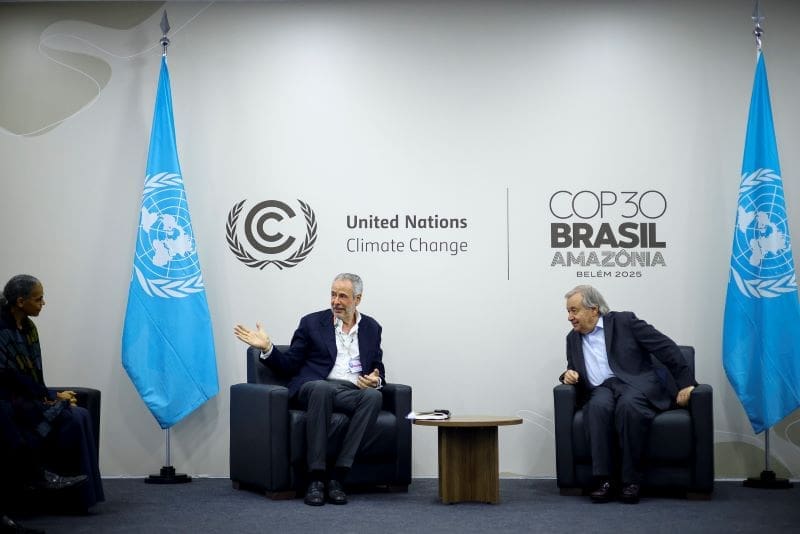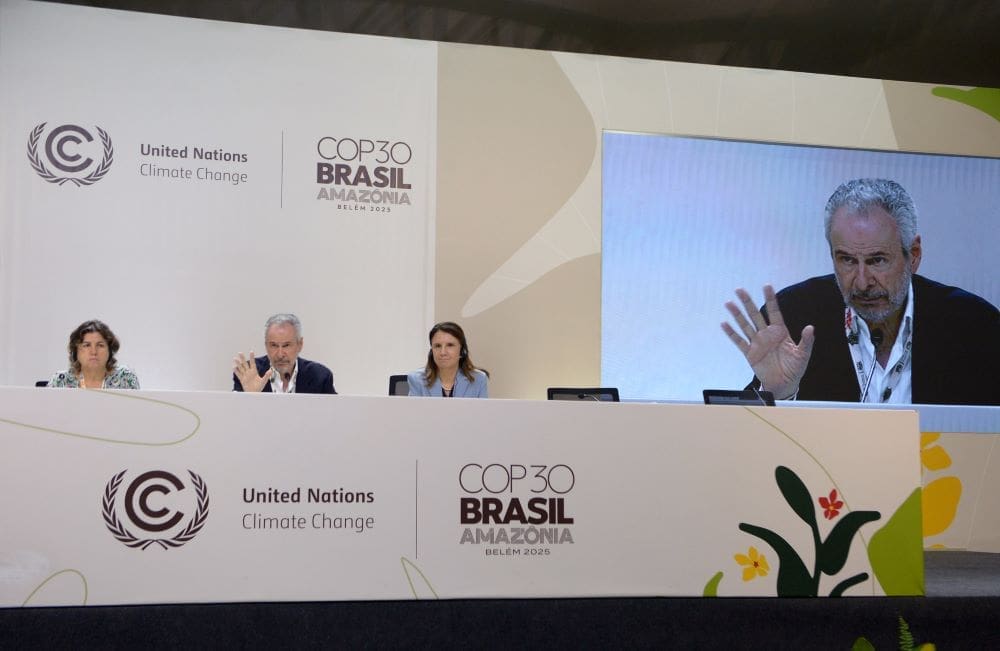Belém, Brazil | AFP | Muser NewsDesk
COP30 hosts Brazil on Monday extended negotiations into the night at the UN climate talks as they pushed for a rapid compromise among countries very much at deep odds.
Following a difficult first week, Brazil set a deadline for nations to finalize “a significant part” of the negotiations by Tuesday evening for approval the following day.
“It’s super difficult as you know… but all involved thought that it’s worth a try,” said COP30 President Andre Correa do Lago in the rainforest city of Belem where the talks are underway.
Sleepless nights are assured, with Correa do Lago extending the program so negotiators were “able to continue working at night.”
They have their work cut out.
No progress has been made to reconcile differences over weak climate commitments, insufficient financial pledges and trade measures.
China and India are leading a push for COP30 to adopt a decision against unilateral trade barriers, singling out the EU’s Carbon Border Adjustment Mechanism (CBAM) for attack.
Tested since 2023 and set to become fully operational in 2026, CBAM targets imports of carbon-intensive goods such as steel, aluminum, cement, fertilizers, electricity and hydrogen.
The head of China’s COP30 delegation, Li Gao, told AFP last week that nations should “avoid the negative impact of, for example, geopolitical unilateralism or protectionism.”
But the EU’s climate commissioner, Wopke Hoekstra, hit back at attacks over the bloc’s flagship policy and defended carbon pricing as “something that we need.”
“We’re not going to be lured into the suggestion that actually CBAM is a unilateral trade measure. And in that realm, we’re also not going to discuss it,” Hoekstra said in a news conference.
EU and Chinese officials were due to hold talks later Monday.

Sleepless in Belem
UN climate chief Simon Stiell urged negotiators to tackle “the hardest issues fast” to avoid going into overtime at the summit’s close on Friday.
“When these issues get pushed deep into extra time, everybody loses. We absolutely cannot afford to waste time on tactical delays or stonewalling,” he said.
The COP30 presidency published a memo Sunday evening summarizing the divergent viewpoints and proposing options.
Money is again at the heart of the negotiations, after last year’s summit in Baku ended with an agreement for developed countries to provide $300 billion annually in climate finance to poorer nations — a figure criticized as greatly insufficient.
Developing countries, especially from Africa, want COP30 to point the finger at developed nations for falling short on providing financing to help adapt to climate change and cut emissions.
Another divisive issue was a push by island states — backed by Latin American nations and the EU — for COP30 to respond to the latest projections showing the world will fail to limit warming to 1.5 °C.
But major emerging countries, from China to Saudi Arabia, are wary of any text that implies they are not doing enough to curb climate change.
“For Small Island Developing States, 1.5 °C is not a political slogan. It is a non-negotiable survival threshold for our people, our culture, and our livelihoods,” said Steven Victor, the environment minister of Palau, which is chairing the Alliance of Small Island States (AOSIS).
Fossil fight
Victor told fellow ministers that AOSIS was disappointed over a lack of progress since nations agreed in 2023 at COP28 in Dubai to transition away from fossil fuels.
Host nation Brazil wants COP30 to send an ambitious signal on fossil fuels, but it remains unclear what form this might take.
Even supporters are doubtful that stronger language on fossil fuels could be agreed by all countries at COP30 given fierce opposition from major oil-producing nations, among others.
“At the end of the day… it’s about phasing out fossil fuels if we are to solve this problem,” a delegate from a European country supportive of Brazil’s fossil fuel push told AFP.
“They are not talking about it in the negotiating rooms. Someone has to do something about it.”
Brazil’s Vice President Geraldo Alckmin urged ministers on Monday to agree to “integrated action plans” for transitioning away from fossil fuels.
Alckmin said President Luiz Inacio Lula da Silva might come to Belem this week, which would be “extremely positive.”
“Brazil is committed to combating climate change,” he said.
ia-ico-alb-lth-np/bjt
© Agence France-Presse
Article Source:
Press Release/Material by Benjamin Legendre, with Laurent Thomet in Paris | AFP
Featured image: COP30 President André Corrêa do Lago, COP30 CEO Ana Toni and Liliam Chagas, Director for Climate at the Ministry of Foreign Affairs, attend a press conference during the 30th Conference of the Parties (COP30). Credit: Antonio Scorza | COP30




